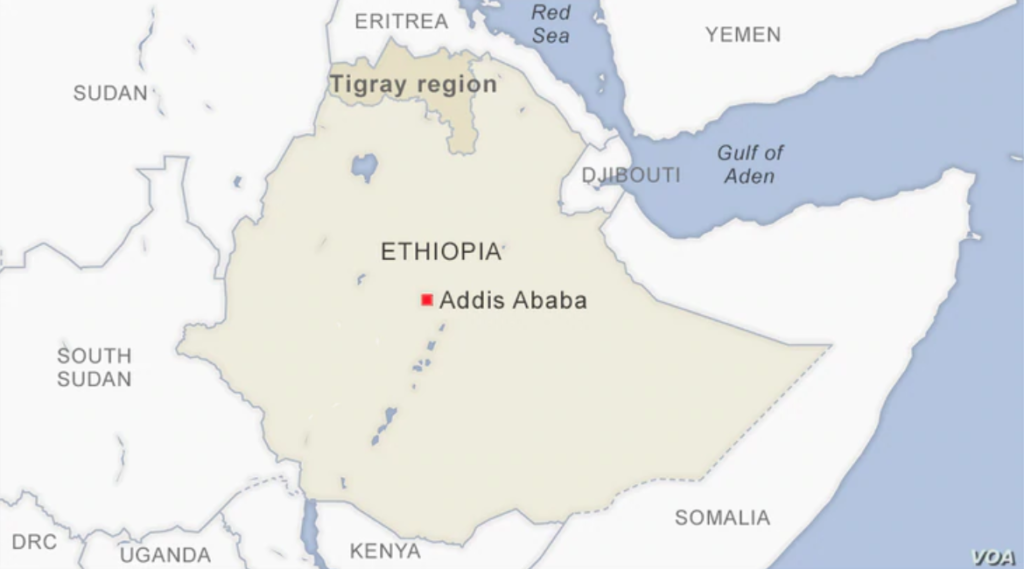
As the United States grapples with the impact of COVID-19 on public health and economic security at home, urgent global humanitarian crises are escalating rapidly and undoing decades of human and economic development around the world.
When Ethiopia—a longtime hub for American engagement and development in East Africa—postponed its national elections due to COVID-19 concerns, political conflict ensued and turned violent. A humanitarian crisis quickly escalated. According to the latest estimates, 96,000 Eritrean refugees are currently sheltering in Tigray, Ethiopia and close to 50,000 Ethiopian refugees in Sudan are in grave danger of running out food, water, and staple supplies after six weeks of violent conflict.
Regional impacts of the global pandemic—lockdowns, restrictions, and supply chain restraints, to name a few—are making it harder to get critical assistance into the region, especially to refugees who are living in conditions that do not allow for social distancing, hand-washing, and other health precautions.
Conflict started between the Tigray People’s Liberation Front (TPLF) and Ethiopian government in September 2020, when the TPLF openly resisted the government’s decision to postpone the general elections and proceeded with its own parliamentary elections.
Photo credit: Voice of America

Ethiopia postponed its general elections scheduled for August 2020 due to coronavirus concerns, but in Tigray, a northern region of Ethiopia, the Tigray People’s Liberation Front (TPLF) and former ruling party of the country, openly resisted and proceeded with its own parliamentary elections in September. In response, Ethiopian lawmakers suspended federal funding to the region.
Tensions escalated to new heights when the TPLF launched a deadly attack on a former military base. On November 4, Prime Minister Abiy declared a military response was required, and Ethiopian National Defense Forces moved in and took Tigray on November 28th. After a month-long power and telecommunications blackout, reports of gross human rights violations are surfacing, including indiscriminate attacks on civilians, pillaging, kidnappings and sexual violence against women and girls, and forced recruitment of Tigrayan youth to fight against their own communities.
Following the Ethiopian National Defense Forces’ declaration of victory, the challenge of delivering humanitarian assistance looms large. The United Nations and other international aid groups have reported an ongoing inability to access the region for aid deliveries.
The International Committee of the Red Cross (ICRC) reported a shortage of medical supplies at the largest regional hospital where 80 percent of patients are suffering from trauma injuries. The International Rescue Committee (IRC) “is working in Tigray to support 90,000 refugees in four camps with a range of services, including clean water, sanitation, primary healthcare and education.” Camps have limited supplies and those available are nearly depleted, including food and fuel to run the camp’s water pumps. Some reprieve came in late December, when the UN was finally able to deliver food and other supplies to two of these camps—the first delivery since mid-October.
Leaders around the world are calling for free, safe, and unhindered humanitarian access. UN Secretary-General António Guterres recently stated, “I’m very concerned about the situation in Tigray. International humanitarian law must be respected by all parties. I urge Ethiopian leaders to do everything possible to protect civilians, uphold human rights and ensure humanitarian access.”
After the African Union stepped in, the Ethiopian government announced it would deliver aid to areas under federal control as of November 26 through a ‘humanitarian assistance corridor,’ but despite these promises, millions still remain cut off from life-saving supplies and other aid as of mid-December.
It’s worth noting that humanitarian needs throughout the country have not only been exacerbated this year by the pandemic and military conflict but as a result of flooding and a desert locust outbreak. IRC has noted that “more than 8 million are in need of urgent food assistance, and this is expected to rise to 11 million by January [2021].”
U.S. government leaders have spoken out about the crises unfolding in the country and the need for humanitarian support. Secretary Pompeo has underscored the “importance of protecting civilians from further harm, including refugees and civilians fleeing the conflict into Sudan, and allowing international humanitarian organizations access to the Tigray region to ensure the unhindered flow of humanitarian assistance to those in need.”
In Congress, Senate Foreign Relations Committee Chairman U.S. Senator Jim Risch (R-ID) and Ranking Member U.S. Senator Bob Menendez (D-NJ) have encouraged the “pursuit of dialogue” in Ethiopia and the opportunity to “provide prompt humanitarian access” where needed.
The incoming Administration has also weighed in. President-elect Biden’s nominee for Secretary of State, Antony Blinken, said that he is “deeply concerned about the humanitarian crisis in Ethiopia, reports of targeted ethnic violence, and the risk to regional peace and security.” Blinken encouraged the TPLF and Ethiopian authorities to “take urgent steps to end the conflict, enable humanitarian access, and protect civilians.”
Ethiopia is an important strategic partner for the U.S. in Africa—with one of the fastest growing economies in the world and significant U.S. investments in security and peace keeping partnerships in the region. As the country has undertaken important political and economic reforms that will enhance these partnerships and the stability and prosperity of the region, the COVID-induced crisis and conflict related entanglements pose serious risks to this progress.